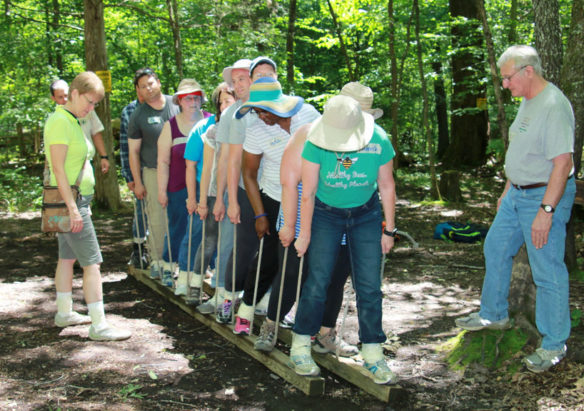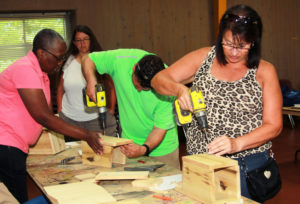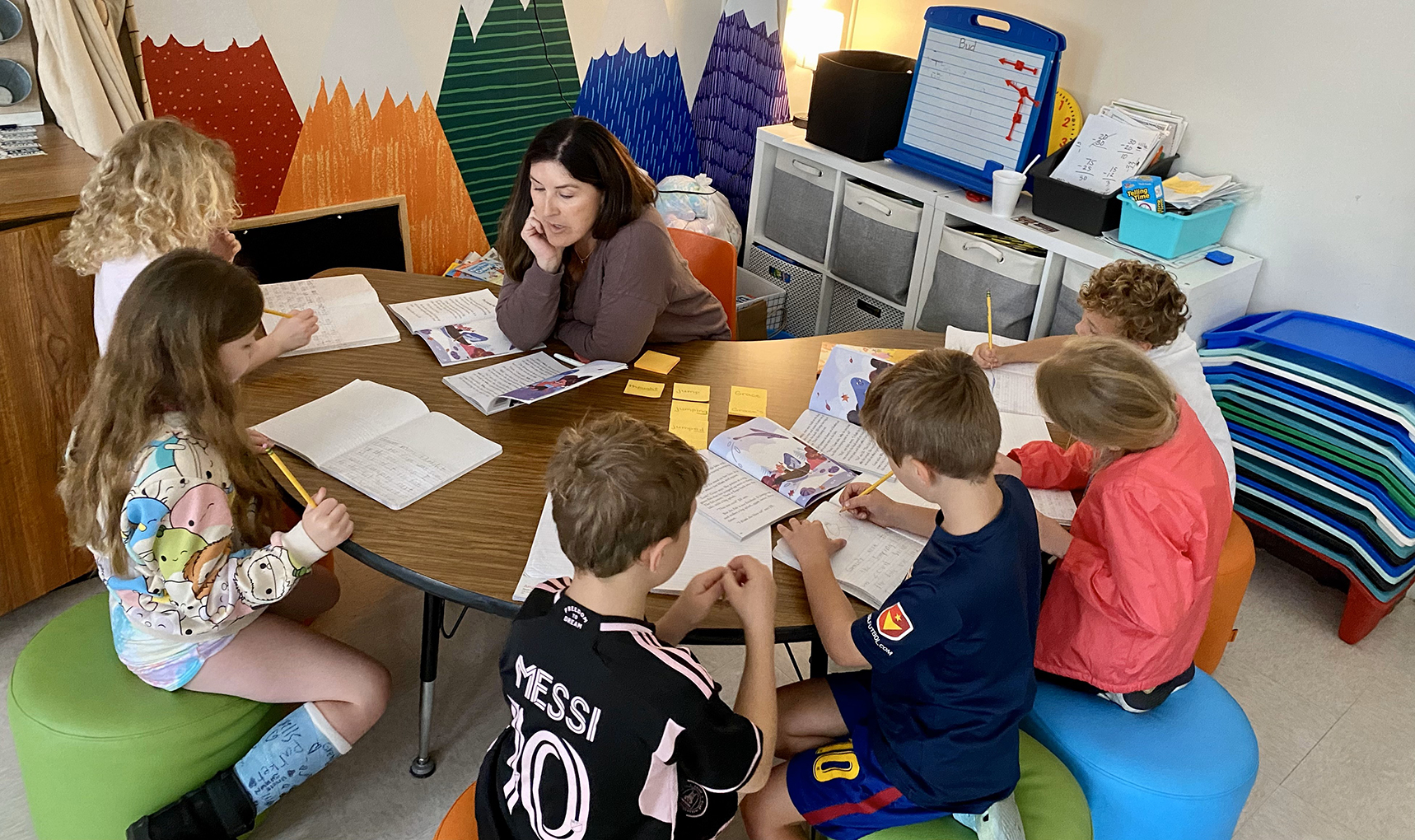
Teachers attending the Teacher Renewal Summer Institute last year engaged in a team building activity where they had to move a ship (the wooden planks) across a line without anybody’s feet touching the ground. Joseph Baust and Terry Wilson have offered the institute for educators most summers since 1978.
Photo courtesy of Deb Spillman
By Veda McClain
veda.mcclain@education.ky.gov
What professional learning opportunity offers educators a chance to connect, create and communicate at a camp on the Land Between the Lakes? What opportunity provides accommodations and meals to participants at a nominal cost and gives them learning experiences to take back to their classrooms?
You guessed it. The Teacher Renewal Summer Institute offers these opportunities.
Joseph Baust and Terry Wilson have offered the Teacher Renewal Summer Institute for educators most summers since 1978. Sponsored through partnership grants from Murray State University, Friends of Land Between the Lakes and the U.S. Forest Service Land Between the Lakes, the institute initially was designed to prepare pre-service teachers in environmental education. It has grown over the years into an opportunity for educators at all levels to learn, grow and make lasting relationships through common interests.
I attended the institute not knowing what to expect. My initial thoughts were that there would be a focus on ecology and the environment and that I would return home with an urgency and desire to recycle paper and water bottles. I wanted to learn more about the environment and how I could use those lessons when supporting teachers in literacy. While the institute did focus on environmental education, my initial notions were quickly changed.
The institute is held for seven days each year at Brandon Spring Camp in Dover, Tenn., and approximately 40 individuals from all over Kentucky participate. Activities at the event combine environmental education, mathematics and the arts for insight, fun and learning.
Institute Director Joe Baust said his goal is to give educators enough information so they feel as if they can make a difference.
“You cannot guilt or beat people with knowledge,” Baust said. “They have to want it.”
The institute gives teachers a range of engaging activities that they can replicate in their classrooms. These activities span all content areas, including connecting aspects of the arts to outdoor activities.

The Kentucky Department of Education’s Veda McClain, from left, Eric Reimer, an elementary school teacher from Barren County; and Becky Whelan, an elementary school teacher from Meade County, make bluebird boxes at last year’s Teacher Renewal Summer Institute.
Photo courtesy of Deb Spillman
Some of the activities at the summer institute, at first glance, might not seem to have much to do with classes outside of the sciences. But, Baust said, environmental education embraces all of the best of teaching and learning and connects all content areas to help learners make meaning.
Activities at the institute have included writing haikus while standing in the middle of a stream in the woods, experimenting with bubble making and finding out which solutions make the biggest bubbles, creating herb gardens, making bird houses and homemade soap, and canoeing. Participants also have cooperatively created a whale on the lawn, explored a predator-prey experiment and listened to stories and sung around the campfire.
Numerous activities also have included writing about nature through poetry and pondering our connections to the environment. Other aspects of the arts include photography, using watercolors to show lines in nature, leaf relief and marbling. Presenters have included musicians and dramatists who led participants in songs and in reader’s theater activities, an author who discussed race relations, nursery owners and other craftspeople. Evenings were spent listening to presenters and later interacting with other participants with board games.
Baust said the summer institute offers educators the opportunity to rediscover the “aha” of learning. He contends that learning is a joyous endeavor and tricks do not work when teaching our students.
“Educators must offer authentic learning for students,” he said. “When the environment is integrated in context, students perform better in all areas.”
As for the participants, Baust said the campground is a place of community with a sense of feeling secure without judgment. It is a place to take learners outside of their comfort zones and build close friendships that last.
“These people lift my spirits,” Baust said.
Institute participants ranged from new campers to folks who had attended many times. The veteran campers said it was the best learning opportunity for them and they look forward to it every year because they never know what they will learn about teaching and themselves.
As a first-year participant, I was pleasantly surprised by what I was able to do with the help of other educators and learners. I spent a lot of time outside and learning about the history of the Land Between the Lakes and about myself. I learned how to dodge skunks and how to look for deer in the dark. Most importantly, I gained a deeper appreciation for the environment and the role it can play in teaching our students in any content area.
For more information about the Teacher Renewal Summer Institute, contact Joe Baust at josephbaust@me.com.



Leave A Comment